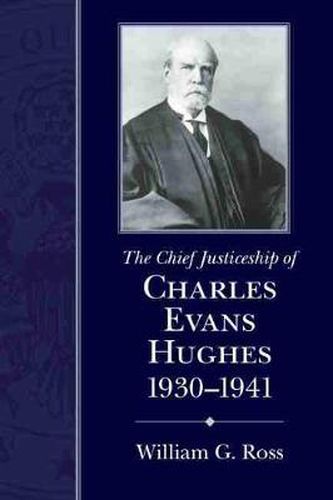Readings Newsletter
Become a Readings Member to make your shopping experience even easier.
Sign in or sign up for free!
You’re not far away from qualifying for FREE standard shipping within Australia
You’ve qualified for FREE standard shipping within Australia
The cart is loading…






During the 1930s the U.S. Supreme Court abandoned its longtime function as an arbiter of economic regulation and assumed its modern role as a guardian of personal liberties. William G. Ross analyzes this turbulent period of constitutional transition and the leadership of one of its central participants in
The Chief Justiceship of Charles Evans Hughes, 1930-1941 . Tapping into a broad array of primary and secondary sources, Ross explores the complex interaction between the court and the political, economic, and cultural forces that transformed the nation during the Great Depression. Written with an appreciation for both the legal and historical contexts, this comprehensive volume explores how the Hughes Court removed constitutional impediments to the development of the administrative state by relaxing restrictions previously invoked to nullify federal and state economic regulatory legislation. Ross maps the expansion of safeguards for freedoms of speech, press, and religion and the extension of rights of criminal defendants and racial minorities. Ross holds that the Hughes Court’s germinal decisions championing the rights of African Americans helped to lay the legal foundations for the civil rights movement. Throughout his study Ross emphasizes how Chief Justice Hughes’ brilliant administrative abilities and political acumen helped to preserve the Court’s power and prestige during a period when the body’s rulings were viewed as intensely controversial. Ross concludes that on balance the Hughes Court’s decisions were more evolutionary than revolutionary but that the court also reflected the influence of the social changes of the era, especially after the appointment of justices who espoused the New Deal values of President Franklin Delano Roosevelt.
$9.00 standard shipping within Australia
FREE standard shipping within Australia for orders over $100.00
Express & International shipping calculated at checkout
During the 1930s the U.S. Supreme Court abandoned its longtime function as an arbiter of economic regulation and assumed its modern role as a guardian of personal liberties. William G. Ross analyzes this turbulent period of constitutional transition and the leadership of one of its central participants in
The Chief Justiceship of Charles Evans Hughes, 1930-1941 . Tapping into a broad array of primary and secondary sources, Ross explores the complex interaction between the court and the political, economic, and cultural forces that transformed the nation during the Great Depression. Written with an appreciation for both the legal and historical contexts, this comprehensive volume explores how the Hughes Court removed constitutional impediments to the development of the administrative state by relaxing restrictions previously invoked to nullify federal and state economic regulatory legislation. Ross maps the expansion of safeguards for freedoms of speech, press, and religion and the extension of rights of criminal defendants and racial minorities. Ross holds that the Hughes Court’s germinal decisions championing the rights of African Americans helped to lay the legal foundations for the civil rights movement. Throughout his study Ross emphasizes how Chief Justice Hughes’ brilliant administrative abilities and political acumen helped to preserve the Court’s power and prestige during a period when the body’s rulings were viewed as intensely controversial. Ross concludes that on balance the Hughes Court’s decisions were more evolutionary than revolutionary but that the court also reflected the influence of the social changes of the era, especially after the appointment of justices who espoused the New Deal values of President Franklin Delano Roosevelt.